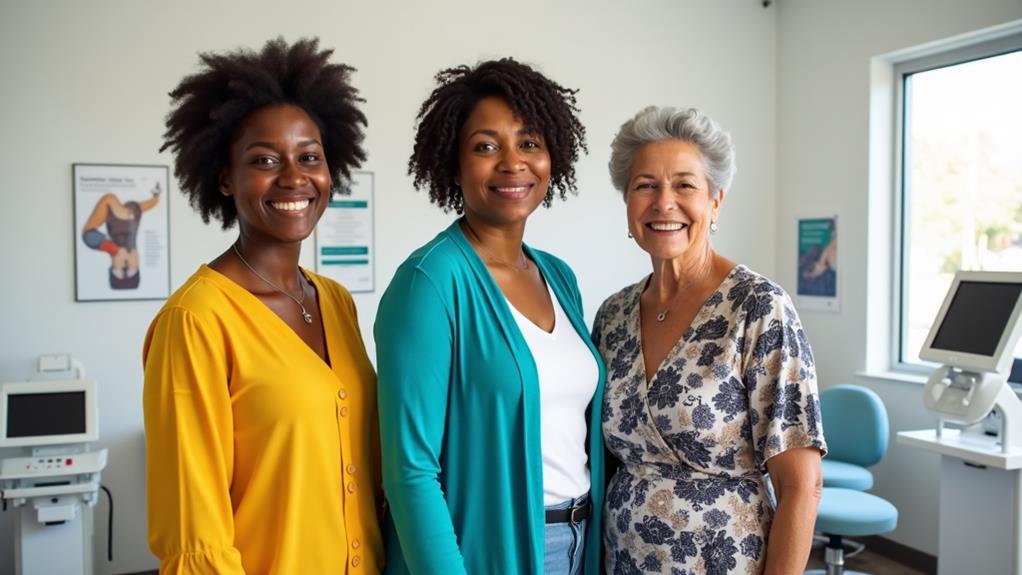Did you know that Black women are 40% more likely to die from breast cancer than white women? This startling statistic underscores the critical need for increased awareness and targeted healthcare strategies. As a Black woman, you're facing unique challenges in breast health, from systemic barriers to more aggressive tumor types. But don't let these obstacles deter you. By understanding your specific risks and taking proactive steps, you can greatly improve your chances of early detection and successful treatment. What follows is a thorough guide that will equip you with the knowledge and tools to stay ahead in your breast health journey.
Understanding Breast Cancer Disparities

When it comes to breast cancer, Black women face notable disparities that can't be overlooked. Breast cancer statistics reveal that while Black women are less likely to develop breast cancer, they're more likely to die from it compared to other racial groups. This disparity stems from various factors, including later-stage diagnoses and more aggressive tumor types.
You should be aware that healthcare access plays an essential role in these disparities. Many Black women face barriers to quality healthcare, including lack of insurance, limited access to screening facilities, and financial constraints. These obstacles can lead to delayed diagnoses and treatment, greatly impacting survival rates.
Additionally, systemic racism and unconscious bias in the healthcare system can affect the quality of care you receive. Some healthcare providers may dismiss or underestimate your concerns, leading to missed opportunities for early detection and intervention.
Understanding these disparities is the first step in advocating for your health. By being informed, you can actively seek out appropriate screenings, demand quality care, and make informed decisions about your breast health.
Risk Factors for Black Women
Understanding risk factors specific to Black women is a key part of breast health awareness. Your family history plays a significant role, as genetic predisposition can increase your risk. Hormonal influences, such as early menstruation or late menopause, may also contribute.
It's important to recognize that socioeconomic status can impact your access to healthcare and preventive screenings. Environmental factors, including exposure to certain chemicals or pollutants, may affect your breast health.
Body image concerns can sometimes lead to delayed medical care, so it's important to prioritize your health over societal expectations. Healthcare access is a significant factor; regular check-ups and mammograms are essential for early detection.
Nutritional considerations are important, as a balanced diet can help reduce your risk. Be mindful of the psychological impact of breast health concerns, as stress and anxiety can affect your overall well-being.
Regular Screening Recommendations

Vigilance is key when it comes to regular breast cancer screenings for Black women. You should be aware of the specific mammogram guidelines tailored to your needs. The American Cancer Society recommends that Black women begin annual mammograms at age 40, earlier than the general population. This is due to the higher risk and more aggressive forms of breast cancer often found in Black women.
In addition to annual mammograms, you should perform monthly breast self-exams and have clinical breast exams by a healthcare provider at least once a year. It's essential to maintain these screening intervals consistently.
If you have a family history of breast cancer or other risk factors, your doctor may recommend more frequent screenings or additional imaging tests like MRIs.
Don't hesitate to discuss your individual risk factors with your healthcare provider to determine the most appropriate screening schedule for you. Remember, early detection is critical for successful treatment outcomes.
Self-Examination Techniques
Self-examination is a crucial tool in your breast health arsenal. Performing regular breast self-exams can help you detect any changes early, potentially saving your life. You should conduct these exams monthly, ideally a week after your menstrual cycle ends.
To begin, stand in front of a mirror with your arms at your sides. Look for any visible changes in breast size, shape, or skin texture. Raise your arms above your head and repeat the observation.
Next, lie down and use your right hand to examine your left breast, and vice versa. Use the pads of your three middle fingers to make small circular motions, covering the entire breast area and armpit. Apply different levels of pressure to feel all breast tissue layers.
Genetic Testing and Counseling

Genetic testing can be a powerful tool in evaluating your breast cancer risk. It allows you to identify specific genetic markers that may increase your susceptibility to breast cancer. As a Black woman, it's vital to understand the importance of genetic testing and counseling options available to you.
Start by discussing your family history with your healthcare provider. They'll help you determine if genetic testing is appropriate based on your risk assessment. If recommended, seek out testing facilities that prioritize accessibility for Black women, as healthcare equity in this area is essential.
During genetic counseling, you'll explore the potential implications of your test results. This process empowers you to make informed decisions about your breast health and future screening plans.
Remember, a positive result doesn't guarantee you'll develop breast cancer, and a negative result doesn't mean you're risk-free.
Consider reaching out to support groups or organizations that focus on breast health for Black women. They can provide valuable resources and connect you with others who've gone through similar experiences.
Lifestyle Choices for Prevention
While genetic factors play a role in breast cancer risk, your daily choices can greatly impact your breast health. By adopting healthy lifestyle habits, you can notably reduce your risk of developing breast cancer.
Start by focusing on your nutrition habits. Incorporate a balanced diet rich in fruits, vegetables, whole grains, and lean proteins. Limit processed foods and saturated fats.
Regular exercise routines are vital; aim for at least 150 minutes of moderate activity or 75 minutes of vigorous activity weekly. Don't forget about stress management techniques like meditation, yoga, or deep breathing exercises to keep your cortisol levels in check.
Prioritize sleep quality by maintaining a consistent sleep schedule and creating a relaxing bedtime routine. Limit alcohol consumption to no more than one drink per day, if any.
If you smoke, consider smoking cessation programs to quit. Maintaining a healthy weight through a combination of proper nutrition and exercise is essential.
Navigating Healthcare Systems

Maneuvering healthcare systems can be overwhelming, especially for Black women seeking breast health services. You'll often face unique challenges, from insurance complexities to systemic barriers.
To navigate these hurdles effectively, start by improving your health literacy. Understand your insurance coverage and know your rights as a patient.
When scheduling appointments, don't hesitate to ask questions about wait times and follow-up care. Seek out providers who demonstrate cultural competence and are willing to communicate clearly.
If you encounter difficulties, remember that patient advocacy is essential. Speak up for yourself or consider bringing a trusted friend or family member to appointments for support.
Be prepared to address potential healthcare access issues. If you're facing insurance challenges, explore community resources or financial assistance programs.
Many hospitals and clinics offer care navigation services to help you coordinate your breast health needs.
Support Networks and Resources
A strong support network is essential for Black women traversing breast health challenges. You don't have to face this journey alone. Seek out support groups specifically tailored to Black women's experiences with breast health. These groups offer a safe space to share concerns, learn from others, and find emotional support from those who truly understand your unique challenges.
Take advantage of resource directories that cater to Black women's health needs. These directories can connect you with culturally competent healthcare providers, financial assistance programs, and educational materials. Look for organizations like the Black Women's Health Imperative or Sisters Network Inc., which offer extensive resources and support.
Don't hesitate to lean on your family, friends, and community for support. They can provide practical help, emotional comfort, and advocacy when needed. Consider involving them in your healthcare journey, whether it's accompanying you to appointments or helping you navigate treatment options.
Overcoming Cultural Barriers

Cultural barriers can greatly impact breast health awareness and care for Black women. These barriers often stem from deeply rooted cultural perceptions about health, modesty, and the role of women in society.
To overcome these obstacles, it's essential to recognize and address them head-on. You might encounter resistance to discussing breast health openly or feel uncomfortable with physical examinations. Remember, your health is paramount, and there's no shame in prioritizing it.
Seek out healthcare providers who understand and respect your cultural background. Don't hesitate to ask questions or voice your concerns. Effective communication strategies can help bridge the gap between cultural beliefs and medical necessities.
Educate yourself about breast health using culturally relevant resources. Share this knowledge with your family and community to foster a supportive environment. If language is a barrier, request an interpreter or bring a trusted friend to appointments.
Consider joining support groups specifically for Black women, where you can discuss your experiences and learn from others who've faced similar challenges.
Advocacy and Community Engagement
Empowerment through advocacy and community engagement is essential for improving breast health awareness among Black women. You can take an active role in this process by participating in community outreach programs and policy advocacy initiatives. Seek out local organizations that focus on Black women's health and volunteer your time or resources.
These groups often host educational events, support groups, and screening programs that can make a significant impact in your community.
Consider becoming a breast health advocate yourself. Share your knowledge with friends, family, and colleagues, and encourage them to prioritize regular screenings and self-exams. You can also engage with policymakers to push for increased funding for breast cancer research and improved access to healthcare services for Black women.
Join or create support networks that provide a safe space for Black women to discuss their health concerns and experiences. These networks can offer emotional support, practical advice, and valuable information about breast health.
Advancements in Treatment Options

Recent years have seen remarkable advancements in breast cancer treatment options, offering new hope for Black women facing this disease. You now have access to more personalized and effective therapies than ever before.
Targeted therapies are revolutionizing breast cancer treatment. These drugs focus on specific genetic mutations or proteins in cancer cells, potentially reducing side effects and improving outcomes. For Black women, who often face more aggressive forms of breast cancer, these targeted approaches can be particularly beneficial.
Clinical trials are another important avenue for accessing cutting-edge treatments. They offer opportunities to receive innovative therapies before they become widely available. As a Black woman, your participation in these trials is essential for ensuring new treatments are effective for your community.
Immunotherapy, which harnesses your body's immune system to fight cancer, is showing promise in certain breast cancer types.
Additionally, advancements in radiation therapy and surgical techniques are leading to more precise treatments with fewer side effects.
Conclusion
You've learned about the unique challenges Black women face with breast health, yet ironically, knowledge alone won't save lives. It's your action that counts. Don't let statistics define your future; rewrite them. Embrace screenings, self-exams, and genetic testing as your allies. Build your support network, challenge barriers, and become an advocate. Remember, your awareness isn't just for you—it's a lifeline for your community. Stay ahead, stay alive.


